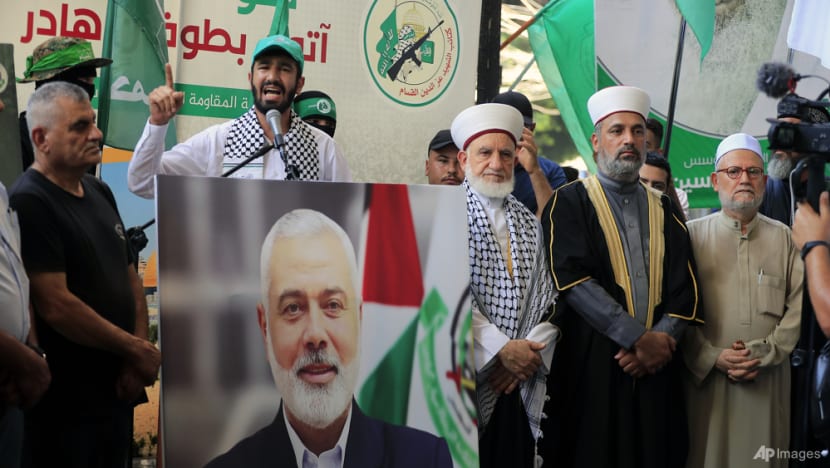Iran’s response to killing of Hamas leader Haniyeh will dictate possibility of wider war, say analysts
Ismail Haniyeh, who was the Palestinian militant group’s face of international diplomacy in recent years, was killed by a missile strike in the Iranian capital Tehran.


This audio is generated by an AI tool.
The assassination of Hamas leader Ismail Haniyeh on Wednesday (Jul 31) has renewed fears of the Gaza war turning into a broader Middle East conflict, but experts told CNA this depends on how Iran responds in due course.
Haniyeh, who was the Palestinian militant group’s face of international diplomacy in recent years, was killed by a missile strike in Iran's capital Tehran. This was hours after he attended a swearing-in ceremony for Iran’s new president.
“On one hand, Iran still very much does not want to be drawn into an all-out war,” said Jonathan Panikoff, the United States government's former deputy national intelligence officer on the Middle East.
“On the other hand, as we saw in April, there's a real concern that Iranian deterrence just is not sufficient enough to prevent these types of Israeli attacks,” he added, referring to a strike on Iran’s embassy in Syria that Israel is suspected to have orchestrated.
Although the strike on Haniyeh was widely assumed to have been carried out by Israel, Prime Minister Benjamin Netanyahu's government made no claim of responsibility and said it would make no comment on the killing.
Iran has said it will retaliate. Its supreme leader Ayatollah Ali Khamenei vowed “harsh punishment” for Israel, as Haniyeh “was martyred” in Iranian territory.
Iran-backed Hamas’ armed wing said in a statement that the killing would "take the battle to new dimensions and have major repercussions".
UNCLEAR POLITICAL DYNAMICS IN IRAN
Jessica Genauer, senior lecturer in international relations at Flinders University, said the world is waiting to see how Iran responds, whether directly or through their regional proxies like Lebanese militant group Hezbollah or the Houthi rebels from Yemen.
“Hamas as an organisation is obviously quite worn down from the last sort of months of Israel's military operation into Gaza, so I don't know whether we're going to see any … strong capability from Hamas to escalate conflict at this stage,” she told CNA938.
“The way in which Iran responds might be even more important in terms of whether or not the situation now starts to escalate further or not.”
Panikoff told CNA’s Asia First programme that there will be “a lot of unclear political dynamics” in Iran that will drive how far it will take its response.
Iran’s new president Masoud Pezeshkian was sworn in on Tuesday, replacing hardliner Ebrahim Raisi who was killed in a helicopter crash in May.
“There’s going to be a real concern about whether or not he has the ability to even go against the (Iranian) Revolutionary Guards and the Quds Force if they want to take a more aggressive approach,” added Panikoff, who is director of think tank Atlantic Council's Scowcroft Middle East Security Initiative.
The Quds Force is the elite clandestine wing of Iran’s Islamic Revolutionary Guard Corps, responsible primarily for its foreign operations.
IS THERE A DESIRE TO ESCALATE?
On Wednesday, Hezbollah also confirmed that its top military commander Fuad Shukr was killed in an Israeli strike in the Lebanese capital Beirut.
Political science lecturer Simon Frankel Pratt from the University of Melbourne said the killing of Shukr is a bigger deal for Iran and could lead to "some escalation" in the region.
However, he reiterated that Iran and Hezbollah "don't have much of a desire to escalate".
H A Hellyer, senior associate fellow at the Royal United Services Institute for Defence and Security Studies, also said it is unclear if Israel, Iran and Hezbollah have shifted in their unwillingness to expand the conflict beyond Gaza and their borders.
He pointed out that for the situation to spiral, Israel requires engagement from Iran, Hezbollah and others.
“I’m not sure that they’ve got (this engagement),” he said.
Hellyer also noted that Netanyahu, who is now deeply unpopular domestically and has faced growing strains on his coalition government, is being pressured by different quarters to reach a ceasefire in the Gaza war as well.
COULD HEZBOLLAH RESPOND FOR IRAN?
In terms of whether Iran could ask Lebanon’s Hezbollah – its strongest proxy force in the region – to respond on its behalf, Panikoff called this a “double-edged sword”.
It would allow Iran to protect its homeland but would lead to Iran expending Hezbollah while Iran has been trying to save the group, he noted.
Panikoff added: “That leads to all sorts of questions. One, if Hezbollah has a full-scale war with Israel, what is the result and what does Hezbollah look like afterwards?
“In other words, is there insufficient deterrence that Israel could say: Now is actually a great opportunity to take advantage of the lack of Hezbollah cruise missiles and ballistic missiles already expended to attack Iran’s nuclear weapons programme?”
He said the response would likely be “asymmetric” and below the threshold of instigating a wider war, perhaps in the form of a joint operation.
“That’s an incredibly difficult needle to thread,” he added.
















